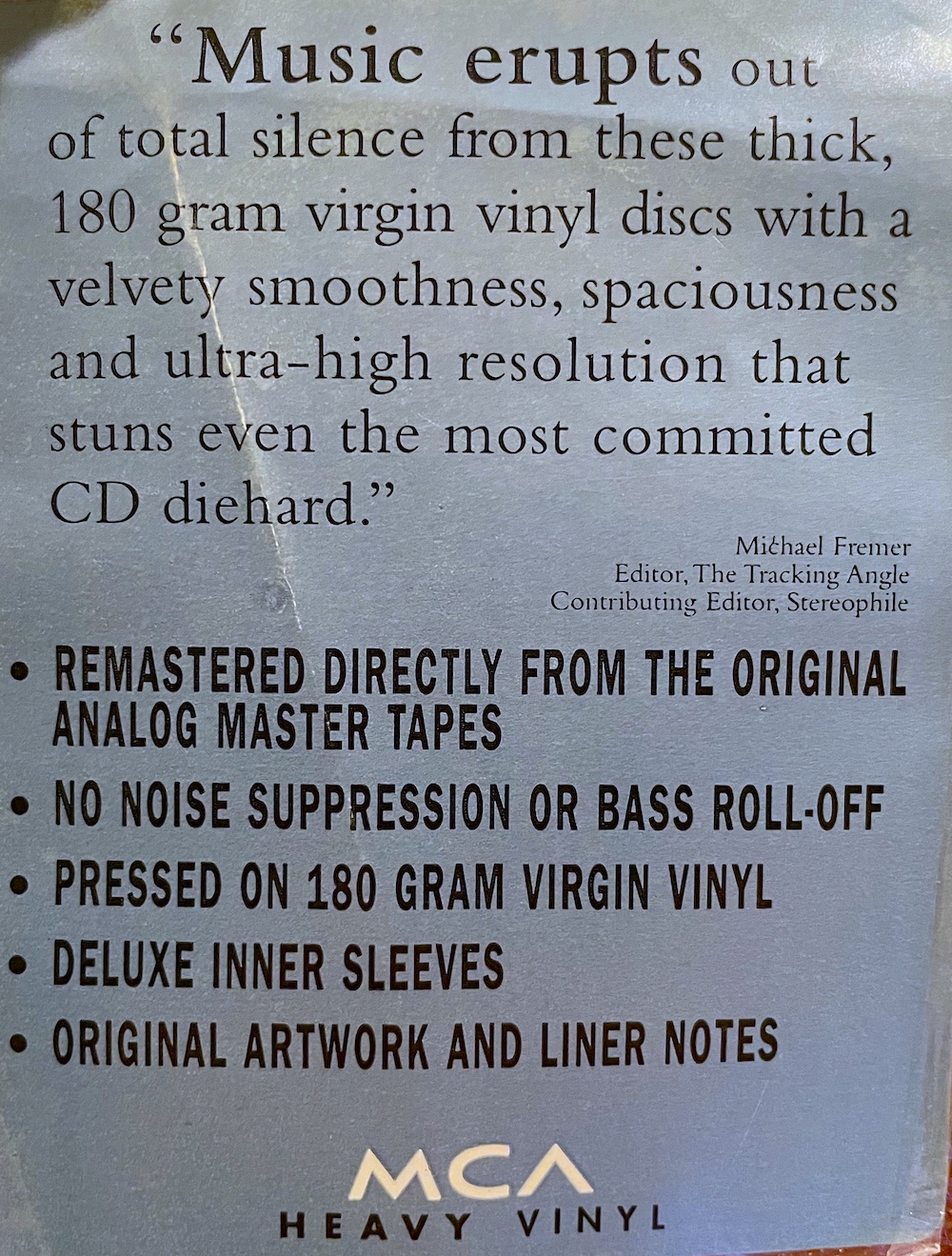"Who's Next" Gets the 1/2 Speed and Plangent Process Treatment
not at all ghastley from Astley!
Update! 10/8/2023 My inbox was filled with "first press" info. That's one of the great things about doing these videos and reviews. You learn stuff. So, I learn that supposedly the "first pressing" I have with date of 8-13-71 is an "east coast" pressing and doesn't sound nearly as good as one with a "W1" in the lead out groove and no date.
So I search my storage space and I have one. I play it. It is much better sounding but hardly the mythical 'greatest' claimed by advocates who never divulge on what they are listening. It's kind of soft and "tubey" but way better than the one I reference in the video. And I note that the handwritten date on the record appears identical to the earlier date listed on the master tape box (7-10-71) so I'd say both were mastered at The Mastering Lab, but one not so well done.
I also was sent to a Steve Hoffman Forum thread where someone claims side one of the original Track that I reference in this video was cut by Doug Sax at TML because of handwritten numerals and yes, I agree with him there, but the Track sounds far superior to the Decca "W1" probably in part due to plating and pressing differences. Side two of that Track has "Bilbo". People speculate why only one side was cut at TML but sometimes a lacquer sent overseas gets ruined in plating so rather than a recut, they might have shipped over a tape copy, Who knows? Good album title!
Since the date on the tape box image in the 2003 3 LP set shown in the video is 7-10-71 I should have realized the 8-13-71 cut was a second lacquer but why does it sound so bad? The handwritten dates on the tape box and inner groove area look like the same person wrote both.
Now back to the original review:
Obviously the photo at the top isn't from the recently released Jon Astley mastered, Plangent processed, 1/2 speed cut LP available in multiple packages. Instead it's the "hype sticker" on the MCA "Heavy Vinyl" version released in 1995 cut all-analog by Kevin Gray, then at Future Disc. I was involved as editor of Tracking Angle the magazine all those years ago.
MCA CEO Doug Morris decided vinyl needed to live and invested in the project, which was done the right way. Unfortunately, at the time stores had just about stopped selling vinyl records and online commerce did not yet exist so the series didn't do well.
At the end of the embedded video is a "lacquer-rip" using the 1995 lacquer, Lyra Atlas Lambda SL cartridge, SAT CF1-12 arm and OMA K3 turntable plugged into the new CH Precision P10 phono preamp. Despite the lacquer's age, in my opinion it sounds quite good and definitely better than the file based new LP.
"Who's Next" remains one of greatest records released during the "rock era" even though it was really an orphan cast-off of Pete Townshend's ambitious, Lifehouse project. The record was recorded in various studios in the U.K. and The United States, yet despite that, it holds together well as a cohesive set of tunes that express the times in which they were written and produced, yet resonate strongly today—especially songs like "Baba O'Reilly", "Song is Over" and "Won't Get Fooled Again" but really there's not a weak tune in the set. Townshend successfully introduces synthesizers to the group's sound giving it a more modern vibe but it doesn't diminish the trio's power and authority.
The video does not discuss the Lifehouse project or lecture on its history. Instead, it compares multiple versions of "Who's Next": original American Decca, original U.K. Track, 1995 MCA "Heavy Vinyl" —LP and lacquers—2003 digitally sourced triple LP featuring outtakes and extras and live Old Vic performance, Classic Records 2005 reissue cut by Chris Bellman from original tape and the new Jon Astley mastered, Plangent processed file cut 1/2 speed at Abbey road by Miles Showell. The only version accidentally omitted that I own was a Japanese pressing (MPF 1106) that i forgot I had! I do not have multiple copies from other countries, or the 1/2 speed mastered MCA version. Most 1/2 speed mastered attempts by major labels tended to present 1/2 the music.
When you go into something with the lowest of expectations yet come away pleasantly surprised, that's saying something and that's what I'm saying. Astley doesn't mess with things unnecessarily as he habitually has done over the years, so the resulting record is at least recognizable—a good start. The timbral balance is even-handed, honest and lump and bump free. the soundstage is wide though without depth or dimensionality and the images are flat and hung as if on a shower curtain instead of being presented in three dimensions as was true on many of the other editions.
The Plangent process locks on the high frequency inaudible bias tone, which should be steady but because of various analog tape issues (machine speed inconsistencies, scrape flutter, wow, and other factors), rarely is. In the digital domain it's possible to 'straighten' the tone and by doing so, correct the errors. The result as can be heard on various projects in which it's been used, including the Bruce Springsteen box set and some Grateful Dead projects, is a pleasing sense of 'forward motion' and the elimination of some audible glitches that haven't bothered me since the dawn of tape recording and probably never will. And since you must first digitize the tape to apply the process, if the tape is in good shape do you really want to do that?
It's important to understand that Plangent isn't "mastering" in the sense that the process isn't involved in equalization or compression or any sonic manipulation. It takes the flat file transfer and does its thing and then the file goes to the mastering engineer who applies the equalization, compression, etc.
The process's inventor says you do want to digitize first and fix problems, and that digitization is transparent to the source but in my listening almost always tells me otherwise (can get fooled again occasionally). Here, the result is flat imaging and a frustrating lack of focus, image three dimensionality and solidity. Is this due to digitization or to compression applied by the mastering engineer? The listener can't know without hearing the flat file, which I've not, but whatever the cause, play the Classic reissue, the MCA reissue, or the U.K. original and Daltry's voice appears vivid, solid, and locked in three-dimensional space. Moon's kick drum slams have shape and texture missing on this reissue, though thankfully the file wasn't dynamically squashed of all life...just some.
I had a mainstream music writer over recently who thought the 1/2 speed mastered McCartney sounded really good....until I played him a U.K. original. It's "nice recording" versus "McCartney's in the room", he said and he was correct. All of the immediacy and transparency gets filtered through an almost invisible gauze. Compared to nothing, or to the original U.S. Decca, this new Who's Next will be well-received but only because buyers won't know what they are missing. You could say "not everyone cares", but I find once they hear that difference, suddenly they care!
There's a multi-LP set with a live San Francisco concert but I passed on it and just bought the single LP version so I could review it. As fore the "deep dive" multi-CD box set, I'll leave that to the music historians, and heavy Who completists.
Were I buying my first copy of this essential rock record, I'd go for a U.K. original, or the MCA "Heavy Vinyl" unless you can drop a substantial amount for the Classic Records version. A just ok one sourced from a file is just ok, though I'll close on a positive note: Jon Astley's light touch mastering and Miles Showell's 1/2 speed cut produces a record that will please many listeners, even those who know how much better a cut from tape version can sound.











































.png)








